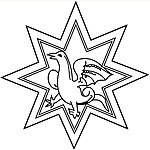Karl Sverkersson

| Swedish Royalty |
| House of Sverker |
|---|
 |
| Sverker I |
| Karl Sverkersson |
|
| Burislev, Kol |
| Sverker II |
| Johan Sverkersson |
Charles "VII" also Carl (actually Charles I), or Karl Sverkersson in Swedish (c. 1130 – 12 April 1167), was ruler of Gothenland, and then King of Sweden from circa 1161 to 1167, when he was assassinated.
He was known as Karl Sverkersson during his reign and is the first historically known king of Sweden with the name Karl.
Life
Charles had rivalled Eric IX of Sweden (whom later generations dubbed martyr and saint) and held some power in Gothenland ("jarlship") already during Eric's reign. It has been claimed that Eric's murder by minions of their rival Magnus Henricson was also backed by Charles.
After the fall of Magnus, Charles received general recognition in Sweden as king. It was also during his reign that the Archbishop of Uppsala was established.
In the spring of 1167, King Charles was killed on the island of Visingsö by supporters of Knut Eriksson, head of the rival Eric dynasty, who overtook the throne. Charles was buried in Alvastra monastery.
Starting from Charles' death, his kinsmen (probably his half-brothers) Burislev and Kol together opposed Canute's kingship and were rival kings, recognized in some Gothenlander parts of Sweden; but last of them was killed in 1173, after which Canute's government got recognized overall.
Family
Charles' wife was Kirsten Stigsdatter, a Danish lady, daughter of Stig Hvitaleder, a Seelander magnate, and his wife who was sister of Valdemar I of Denmark.
Their sole historically attested child was Sverker Karlsson, a young boy when Charles died, and who later became the chosen king Sverker II of Sweden (1195–1208/10) after the death of Charles' rival king Canute I.[1]
Ordinal number
This was the first Swedish king by the name of Charles (Karl). Charles VII is a posthumous invention, counting backwards from Charles IX (1604–1611) who adopted his numeral according to a fictitious history of Sweden. Six others before Charles Sverkersson are unknown to any sources before Johannes Magnus's 16th century book Gothorvm sveonvmqve historia, and are considered his invention.[2] The first Swedish monarch to actually use a regnal number was Charles II (later retrospectively renumbered VIII), on his queen's tombstone (1451) at Vadstena.
Notes
- ^ Lindström, p 267
- ^ Article Karl in Nordisk familjebok
References
- Lindström, Fredrik; Lindström, Henrik (2006). Svitjods undergång och Sveriges födelse (in Swedish). Albert Bonniers förlag. ISBN 91-0-010789-1.
{{cite book}}: CS1 maint: multiple names: authors list (link)
